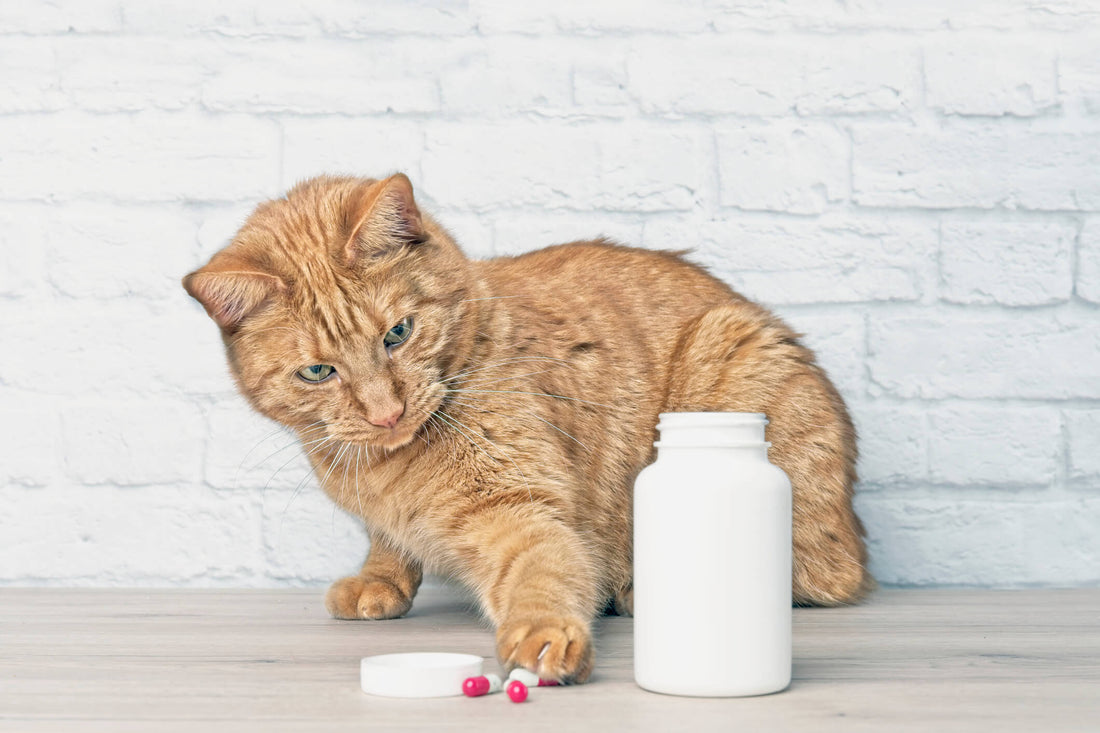
Poison Prevention in Cats 101
Poison prevention isn’t usually at the top of pet parents’ minds. Unfortunately, many pet owners don’t worry about poisoning until after it has already happened. Pet parents need to think about poison prevention before it happens—not after.
Thankfully, it’s very easy to prevent toxic poisoning in cats. Keep your cat safe by recognizing the symptoms, taking action right away and being extra careful with toxins around the home.
Signs of toxic poisoning in cats
Poisoning can cause a wide range of symptoms in cats. The symptoms your cat might present will depend on the type of toxic substance that was ingested, inhaled or absorbed. Most cases of toxic poisoning will lead to digestive upset, changes in behavior and respiratory problems. If these signs suddenly appear, you should contact a vet immediately, even if you don’t know whether your cat ate something poisonous or not.
A poisoned cat may experience one or more of the following symptoms:
- Lethargy
- Drooling
- Labored breathing
- Fever
- Vomiting
- Diarrhea
- Seizures
- Increased thirst
- Excitability
- Depression
Why toxic poisoning is dangerous
It’s difficult to watch a cat suffer the symptoms of toxic poisoning. However, symptoms aren’t the only things that pet parents need to worry about. Poisoning has the potential to cause serious long-term health problems in cats. While early intervention can save a cat’s life, vets can’t always prevent the lasting effects of poisoning.
The most common consequences of cat poisoning are kidney and liver damage. These organs are responsible for filtering toxins out of the blood and safely removing them from the cat’s body. Harmful substances introduce more toxins than the liver and kidneys can process at one time. As a result, toxic poisoning can damage liver and kidney cells, which prevents these organs from functioning properly long after the cat recovers from acute poisoning.
Steps to take if your cat is poisoned
When a cat has been poisoned, it’s crucial to seek medical help right away. Acting fast can save a cat’s life and minimize lasting damage to their organs. The earlier you take action, the better their prognosis will be.
Here’s what you can do if you suspect poisoning in your cat.
- Call a pet poison hotline: If you see that your cat ate something toxic or they’re showing signs of poisoning, the first thing you should do is call a pet poison hotline. The dispatcher can offer assistance before you’re able to reach an emergency vet clinic. Following their instructions might slow the spread of deadly toxins. It’s important to not induce vomiting unless the dispatcher instructs you to do so. In some cases, inducing vomiting can actually worsen the cat’s condition.
- Collect information about the toxin: Learn as much as you can about the substance your cat ingested, inhaled or absorbed. Do your best to figure out when the poisoning occurred and how much of the substance got into their body. When you go to the emergency clinic, bring labels, containers and a sample of the toxic substance. The vet will need this information to diagnose your cat and create an appropriate treatment plan.
- Go to your local emergency clinic: As soon as you can, safely transport your cat to the nearest emergency vet clinic. Even if your cat’s symptoms are minor, a vet will need to examine them for potential damage to the organs. A vet can also administer treatment and provide at-home care instructions.
Tips to prevent toxic poisoning in cats
As with any ailment, prevention is the best medicine when it comes to pet poisoning. You can avoid a stressful (and potentially fatal) situation by incorporating a few safety measures into your daily routine. A little extra caution around the home is all it takes to keep your cat happy and healthy.
Follow these tips to help prevent toxic poisoning in your cat.
- Properly store food and medicine: Many cases of poisoning occur because pet parents leave open medicine and food containers unattended. Make sure human food and medicine is out of reach and store household cleaning products in a locked cabinet.
- Wipe your cat when they come inside: Outdoor cats often come into contact with fertilizers, insecticides and antifreeze spills. Cats ingest these toxins when they lick their fur and paws. If your cat frequently ventures outside, wipe them down with a clean, damp cloth to remove traces of toxic substances.
- Carefully administer cat medication: Poisoning can occur if a pet parent gives their cat a bigger dose of medication than necessary. Make sure you’re giving your cat the correct amount of medication, whether it’s a pill, tincture or powder.
Toxic poisoning can be very scary. Not only does it cause acute symptoms, but it can leave your cat with lasting health problems. If your cat shows signs of poisoning, take them to an emergency vet clinic as soon as possible. The sooner you act, the better!


